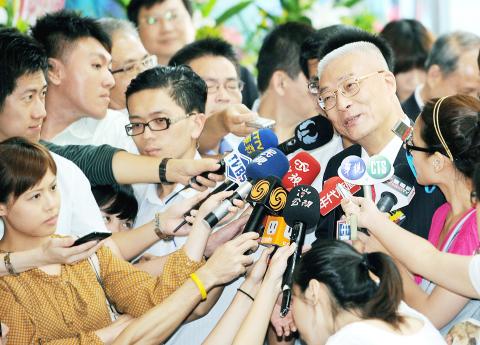Vice President Wu Den-yih (吳敦義) yesterday threatened to take legal action against the Chinese-language weekly Next Magazine if it failed to clarify its accusations alleging his role in a corruption scandal.
In defending his innocence against the allegations, Wu said he has applied for telephone call records of all his family members to dismiss the allegation that calls were made to Wu Men-chung (吳門忠), a family friend who was allegedly involved in the case.
Wu Den-yih denied that his wife, Tsai Ling-yi (蔡令怡), had made a telephone call to Wu Men-chung last week to confirm his family relations with Cheng Tsai-mei (程彩梅). Cheng is the girlfriend of businessman Chen Chi-hsiang (陳啟祥), who allegedly bribed former Executive Yuan secretary-general Lin Yi-shih (林益世) with NT$63 million (US$2.15 million) to secure contracts with China Steel Corp (中鋼) and its subsidiaries.

Photo: Fang Pin-chao, Taipei Times
Wu Men-chung, a votes broker for the vice president in his Nantou County hometown, is the father of the daughter-in-law of Chen’s girlfriend.
Wu Men-chung admitted on Wednesday that he had accepted NT$10 million from Chen for introducing him to local legislators for help, including Lin.
The vice president yesterday said he and his family had no knowledge about Wu Men-chung’s behavior and said he would prove his and his wife’s innocence by producing their telephone records.
“Whether Wu Men-chung took money from Chen or not, it’s none of my business. I did not make any calls to him recently, and he did not call me or my wife, either,” he said.
“I am willing to accept public examination using magnifier, microscope or telescope. However, please do not make up stories with distorting mirrors,” he added.
Next Magazine has linked Wu Den-yih to the case by making accusations that Lin bragged about his relations with Wu Den-yih when asking for bribes from Chen, saying he was handling all of Wu Den-yih’s matters.
Wu yesterday asked the magazine for a correction and said he could file a lawsuit if it failed to clarify the issue.

The manufacture of the remaining 28 M1A2T Abrams tanks Taiwan purchased from the US has recently been completed, and they are expected to be delivered within the next one to two months, a source said yesterday. The Ministry of National Defense is arranging cargo ships to transport the tanks to Taiwan as soon as possible, said the source, who is familiar with the matter. The estimated arrival time ranges from late this month to early next month, the source said. The 28 Abrams tanks make up the third and final batch of a total of 108 tanks, valued at about NT$40.5 billion

Two Taiwanese prosecutors were questioned by Chinese security personnel at their hotel during a trip to China’s Henan Province this month, the Mainland Affairs Council (MAC) said yesterday. The officers had personal information on the prosecutors, including “when they were assigned to their posts, their work locations and job titles,” MAC Deputy Minister and spokesman Liang Wen-chieh (梁文傑) said. On top of asking about their agencies and positions, the officers also questioned the prosecutors about the Cross-Strait Joint Crime-Fighting and Judicial Mutual Assistance Agreement, a pact that serves as the framework for Taiwan-China cooperation on combating crime and providing judicial assistance, Liang

A group from the Taiwanese Designers in Australia association yesterday represented Taiwan at the Midsumma Pride March in Melbourne. The march, held in the St. Kilda suburb, is the city’s largest LGBTQIA+ parade and the flagship event of the annual Midsumma Festival. It attracted more than 45,000 spectators who supported the 400 groups and 10,000 marchers that participated this year, the association said. Taiwanese Designers said they organized a team to march for Taiwan this year, joining politicians, government agencies, professionals and community organizations in showing support for LGBTQIA+ people and diverse communities. As the first country in Asia to legalize same-sex

MOTIVES QUESTIONED The PLA considers Xi’s policies toward Taiwan to be driven by personal considerations rather than military assessment, the Epoch Times reports Chinese President Xi Jinping’s (習近平) latest purge of the Chinese People’s Liberation Army (PLA) leadership might have been prompted by the military’s opposition to plans of invading Taiwan, the Epoch Times said. The Chinese military opposes waging war against Taiwan by a large consensus, putting it at odds with Xi’s vision, the Falun Gong-affiliated daily said in a report on Thursday, citing anonymous sources with insight into the PLA’s inner workings. The opposition is not the opinion of a few generals, but a widely shared view among the PLA cadre, the Epoch Times cited them as saying. “Chinese forces know full well that